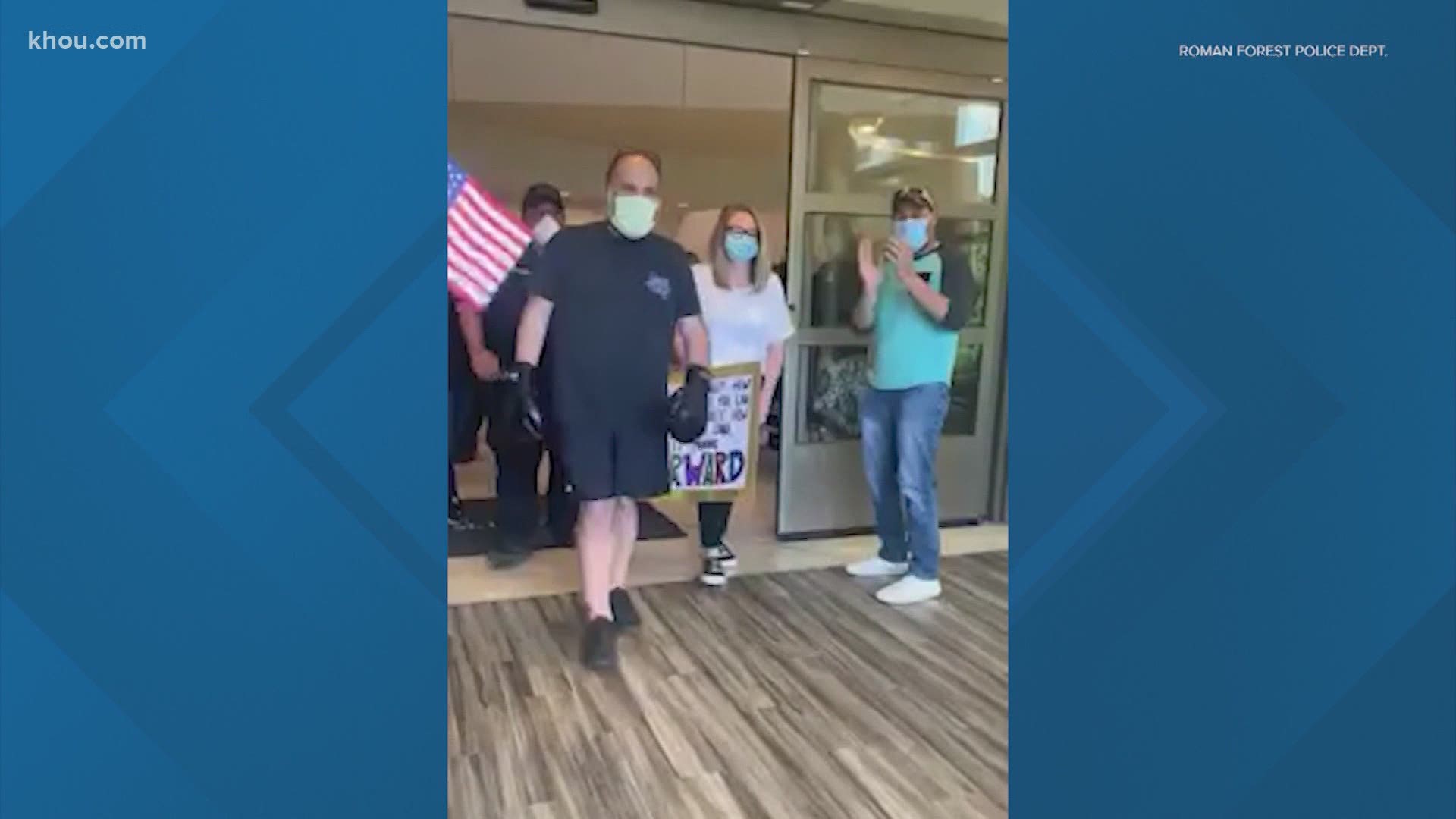MONTGOMERY COUNTY, Texas — Patton Village police officer Chris Hernandez was one of the first community spread COVID-19 cases in the Houston area. Today, he's sharing his story of a miraculous recovery.
Hernandez has been an officer for more than 20 years. He has been shot before in his career but says that doesn’t compare to what he endured at the hospital just a few weeks ago as his body was fighting COVID-19.
“To compare the two, I would rather be shot again than have to go through COVID. That’s how bad it was,” Hernandez said.
RELATED: Great news! Patton Village police officer home after 5 weeks in the hospital with coronavirus
Officer Hernandez said he started with small pains, but after two trips to the doctor's office, it all quickly escalated. He knew he had to go to the hospital.
“I made it about halfway through the parking lot of the emergency room, and I was like I had to stop and breathe again, because I was basically suffocating felt like you were drowning,” Hernandez said.
He checked himself into the CHI St. Luke's Hospital in The Woodlands. Little did he know he had COVID-19 and was one of the first known community spread cases in our area. For weeks, he was in critical condition and on a ventilator.
“Did I think I could possibly die from it? Yes, I did,” Hernandez said.
Finally after weeks of being in the hospital, his body started fighting back and he miraculously recovered. Now he’s counting his blessings and is grateful to be alive.
“I have beaten every odd on how sick I was. I am very blessed. Like the staff told me, it’s a miracle. I am happy to be alive,” Hernandez said.
Hernandez is still doing rehabilitation but hopes to be back at work soon.
Coronavirus symptoms
The symptoms of coronavirus can be similar to the flu or a bad cold. Symptoms include a fever, cough and shortness of breath, according to the Centers for Disease Control. Some patients also have nausea, body aches, headaches and stomach issues. Losing your sense of taste and/or smell can also be an early warning sign.
Most healthy people will have mild symptoms. A study of more than 72,000 patients by the Centers for Disease Control in China showed 80 percent of the cases there were mild.
But infections can cause pneumonia, severe acute respiratory syndrome, kidney failure and even death, according to the World Health Organization. Older people with underlying health conditions are most at risk for becoming seriously ill. However, U.S. experts are seeing a significant number of younger people being hospitalized, including some in ICU.
The CDC believes symptoms may appear anywhere from two to 14 days after being exposed.
Human coronaviruses are usually spread through...
- The air by coughing or sneezing
- Close personal contact, such as touching or shaking hands
- Touching an object or surface with the virus on it, then touching your mouth, nose or eyes before washing your hands.
Help stop the spread of coronavirus
- Stay home when you are sick.
- Eat and sleep separately from your family members
- Use different utensils and dishes
- Cover your cough or sneeze with your arm, not your hand.
- If you use a tissue, throw it in the trash.
- Follow social distancing
Lower your risk
- Wash your hands often with soap and water for at least 20 seconds. If soap and water are not available, use an alcohol-based hand sanitizer.
- Avoid touching your eyes, nose, and mouth with unwashed hands.
- Avoid close contact with people who are sick.
- Clean and disinfect frequently touched objects and surfaces.
- If you are 60 or over and have an underlying health condition such as cardiovascular disease, diabetes or respiratory illnesses like asthma or COPD, the World Health Organization advises you to try to avoid crowds or places where you might interact with people who are sick.
Get complete coverage of the coronavirus by texting 'FACTS' to 713-526-1111.

